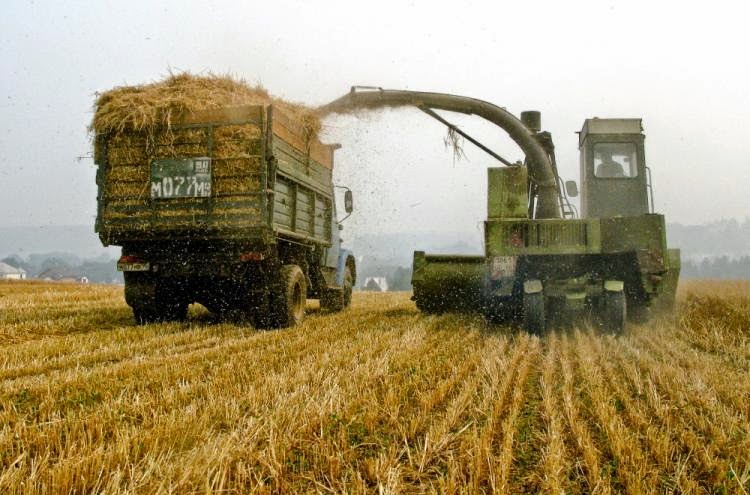Russia may be forced into protecting domestic bread prices
from the country's currency crisis later in the 2014/15 marketing year,
analysts said, challenging government pledges to avoid curbs on grain exports, Reuters says.
Agriculture Minister Nikolai Fyodorov said on Tuesday that
Russia, one of the world's key wheat exporters, would only use its grain
restocking programme to regulate exports, which are running at a record pace
due to a slump in the rouble.
"I think the minister is quite honest when he says
this, but life can force him to change his mind," said Andrey Sizov, the
head of SovEcon agriculture consultancy.
The minister's comments are a step back from what he said
last week when he signalled Moscow would consider all options to restrain
exports except an embargo, which Russia used in 2010 when its crop was hit by
drought.
Russia used a protective duty on wheat exports in 2008, but
recent comments from officials suggest that Moscow will try to keep out of
trouble with trade powers and the global export market by using less
heavy-handed measures.
"We are not discussing any other options (to restrain
grain exports)," Fyodorov told a news conference on Tuesday.
Officials said previously Moscow may consider imposing a
floating tariff as a measure of last resort in 2015, while its phytosanitary
regulator may tighten export rules in general and limit grain exports through companies registered offshore in particular.
Fyodorov said on Tuesday he was awaiting final government
approval for a plan to raise prices at which the state purchases grain for its stocks.
The ministry plans to increase the price for third-class
wheat in the European part of Russia to 10,100 roubles (US$140) per tonne from
6750 roubles, Fyodorov told reporters.
"This level is too low for the current market, they
will not be able to buy significant volumes," Sizov said.
The price for this type of wheat in the region, on an
ex-works basis, was at 11,175 roubles per tonne at the end of last week.The
ministry aims to buy a further 3.5 million tonnes of grain to replenish its own
stocks, which are now at a level of 1.5 million tonnes, Fyodorov added.
"This new (state) price is significantly lower than the
market price, which is not good for all market participants as it raises the
possibility of using administrative resources," said Dmitry Rylko, the
head of IKAR consultancy.
Sizov agreed, adding that he did not expect any grain export
curbs until mid-February.
Russia could export 30 million tonnes of grain this 2014/15
marketing year, starting July 1, without hitting domestic supplies, the
ministry says. So far the country has exported 19 million tonnes of grain,
including 15 million tonnes of wheat.
Fyodorov said the ministry could discuss the problem of
grain sales via shell offshore firms in the future but promised to avoid
"snap decisions".
Depending on how the restrictions are implemented, this move
could be a noticeable restriction on Russian exports, as millions of tonnes of
Russian grains are exported via offices in other countries, especially
Switzerland, a German trader said.
However, the business
could also be switched back to Russian offices fairly quickly so the impact
could be short-term, he added. (US$1 = 71.9590 roubles)
Read the article HERE.
The Global Miller
This blog is maintained by The Global Miller staff and is supported by the magazine GFMT
which is published by Perendale Publishers Limited.
For additional daily news from milling around the world: global-milling.com



No comments:
Post a Comment